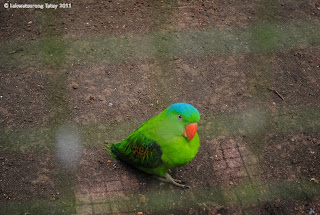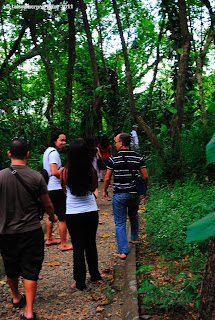Welcome to Crocolandia
by lakwatserong tatay
The Crocodile Farm is almost just like any zoo, but with a lot of crocs. This facility is found in Irawan, Palawan. Skeletal and skin remains of the biggest crocodile caught in Palawan were exhibited at the museum. The croc nursery contains most of the living crocs in the farm. There were about 20 tanks in the nursery, each housing about 15 to 20 baby crocs. We then climbed to a path where we could view the adult crocodiles under us. Before going back to the bus, there was croc photo op where the tourist pays php30 for a chance to have his picture taken with a baby crocodile. Most of the balikbayans and foreigners lined up for that, while I went to check out the souvenir shop which was a few meters away from our tour bus. I got myself a star necklace and a couple of mini rain sticks for my friends.
 |
| Welcome to Palawan Crocodile Farm |
The tour inside to this facility usually took about 20-30 minutes, with entrance fee of php40, it just on the crocodile facility, and there's a part on this Crocodile Farm a Mini Zoo facility. But sad to say i think it has to be rehabilitate, some of the cages doesn't have anything, and some of the structures were already broken. But before i go to the Mini Zoo Park, let me tour you around the Crocodile Facility. Below picture is the start of the tour where a tour guide/facilitator discussing the difference between those crocs, how they live and treated and of course discuss the skeletal bone structure shown also below.
 |
| The journet starts here.... |
This enormous skeleton from a salt water crocodile was captured in the Southern Town of Batarazza after killing a child. This skeletal bone crocodile is measuring 17 foot. But most of the crocs in the farm are not big as this one. Below are some of the my photos about this enormous skeleton of a crocodile.
 |
| Real Bone of Very Huge Crocodile...a must see...^_^ |
 |
| The Head and it's Teeth... |
 |
| My photo ops....^_^ |
 |
| Welcome to Hatchling House..... |
Here's a brief information about this Crocodiles:
Philippine Freshwater / Mindoro Crocodile:
Scientific Name: Crocodylus mindorensisLocal Name: Buwaya, Buaya
Average Length: 2 – 3 meters
Feeding Habit: Hunts other animals for food
Habitat: Freshwater swamps, lakes and rivers
Characteristics: Solitary or in pairs; territoriality is high for adults during breeding season.
Generally will not openly attack unless provoked or threatened.
Lifespan: up to 100 years
Conservation Status: Critically endangered and it is the highest priority for crocodilian species in need for conservation. Only found in the Philippines.
 |
| The Juvenile Crocs. |
Add to that im not really pretty sure if this crocodile is will be used for commercial purposes or the farm is still building up it's stock for the future.
After our enchanting experience with the different juvenile crocs, where now going outside this pen and walk above the outdoor pens where big live and adult crocodile can be found.
Saltwater Crocodile / Indo Pacific Crocodile:
Scientific Name: Crocodylus porosusLocal Name: Buwaya, Buaya
Average Length: 6 – 7 meters (males)
4 – 5 meters (females)
Feeding Habit: Hunts other animals for food
Habitat: Brackish waters, swamps and rivers
Characteristics: Highly territorial, more aggressive and known to attack openly
Lifespan: Up to 100 years
Conservation Status: Endangered due to over hunting, indiscriminate killing and habitat loss, since its hide is very valuable in the leather industry.
 |
| One Big Croc. |
The experience walking above this outdoor pens was pretty intense because you may think, what if this walkway collapsed or some tourist are kidding around, something like that. Most of this big outdoor pens was really crowded with big crocodiles, im not really sure of their ages but one thing that im really sure with this crocodile could really swallow a adult person like me, or could be a "pulutan" for all of those crocs...hehehehe...^_^.
 |
| Adult Crocodiles in the Outdoor Pens |
After the Crocolandia, next stop is the free time roaming around the grounds farm where a variety of animals unique to Palawan are kept.
 |
| Welcom to Palawan Nature Park |
And there our nature walk starts......
 |
| One of the biggest tree on this farm. |
 |
| Palawan Bearcat - Binturong |
Scientific Name: Arctictis binturong whitei
Binturongs live most of their lives in trees. Their tails are well-adapted for grasping to assist them with life in the trees. It is used as extra hand when climbing trees and hanging on branches. When resting in a tree, it will lie on its stomach with its feet dangling, but its tail will have a firm hold, protecting it from falling. They feed mostly on fruits and sometimes small animals.
Can be found: Palawan: other subspecies found in Northern India, Indo-China, Indonesia, Thailand, Burma, Malaysia, Sumatra, Java and Borneo.
 |
| Some migrant birds. |
 |
| Parrots. |
 |
| Monkey. |
 |
| I bought one of this...^_^ |
 |
| Ostrich. |
 |
| Palawan Hornbill - Kalaw |
 |
| White-Bellied Sea Eagle |
 |
| Hope you will help me with this (?)...^_^ |
Here my photo opportunity with a live croc, but just a baby croc.....hehehehe...^_^. My kiss with Crocky.
 |
| Pakiss nga.....muah! |
 |
| Lakwatserong Tatay X-plored this place. |
Yan, nakaisang post nako sa Puerto Princesa Tour namin.......watch for my other stories.....^_^
This story is part of : Five Days of Trip at Palawan











2 comments:
Hello, Im back. :) I often read your blog and I follor also.hehe.. I never visited Palawan yet we are planning as a weekend get away . As usual I enjoyed your blog. Big thanks for sharing.
Great post much appreciate the time you took to write this.
Post a Comment